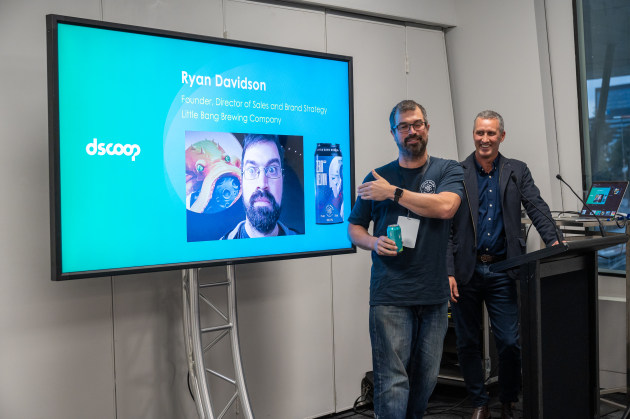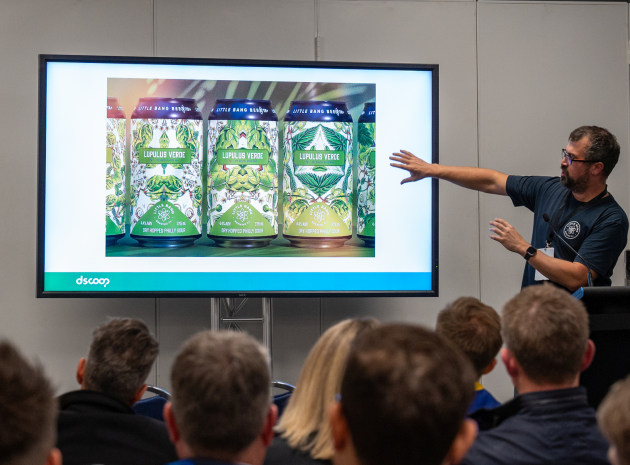Soon after news broke of craft brewer Little Bang Brewing Company’s sale to South Australian Duxton Pubs Group, founder and director of sales and brand strategy, Ryan Davidson, spoke at a Dscoop event for HP Indigo digital press users in Melbourne, during PacPrint.

When Kelvin Gage, global board director of HP Indigo press owners and users community group Dscoop, introduced Ryan Davidson, he joked that he had flown in to the Melbourne printing show by helicopter following the sale of his company the day before.
In his inimitable style, Davidson met this jest with good humour, but was at pains to reassure the audience that the craft brewery would not be losing its independence – in fact it would be “fiercely protected” – and that the sale will allow Little Bang beers to become more widely available, with the brewery growing its reach through hospitality sector channels it now has access to as part of Duxton Pubs.
But Davidson was not there to talk about the sale, rather about how Little Bang’s beer packaging had been key to the company’s ten-year journey to this ultimate success. He described how as a start-up, with a first batch of 5000 litres, buying printed cans was cost-prohibitive because of the volumes required.
The short-run solution took the form of labels, more specifically digitally printed labels – printed on HP Indigo digital press by Peacock Bros. – that enabled not only high levels of creativity and colour variation in the artwork, but also the flexibility to print different labels for every SKU.

“I wanted to turn every beer can into my little sales rep on shelf,” Davidson says. “You have to really, really push as a small business owner; we thought that when we couldn't afford a sales team all over the country pushing our product meant the product itself had to be out there doing the selling for us. On those noisy shelves, we need our beer cans to be reaching out to the punters saying, ‘For God’s sake, pick me up’ even if it's because the punter has thought ‘What on earth even is that? I need to investigate!’
“If you can have that moment of their attention… that two seconds… then you're most of the way to winning.”
Davidson ran through some of the designs and ideas behind them that had brought Little Bang success. He discussed the how the HP SmartStream Mosaic software developed by HP Indigo and running at Peacock Bros. have created labels that “really pop”.
The software can be easily instructed to keep certain graphic elements the same, while allowing others to be varied with infinite combinations – creating a dynamic set of labels that look the same but are not quite the same – piquing consumer interest.

He described how at times HP’s Mosaic is used only sparingly, showing an example of a Union Jack design on a series of cans in which only one part of the flag colour changed – but still that’s enough to attract interest.
The company took variable data on printed labels to the next level with its Little Bang Hazy IPA, where the team spent several months developing an algorithm that gave every single beer can a different name – which has produced over 75,000 different names to date, meaning 75,000 different labels printed in runs of one. Names vary from the sublime to the ridiculous: ‘communist bird performance’ or the ‘religious chastity biscuit’, but they evoke humour, spark interest and are a talking point for the brand.
“And the beauty of it is, if you get a complaint, only one has been printed and you can say you have ‘immediately recalled’ the packaging,” he joked.
Davidson worked through many more examples covering the scope of possibility with HP Mosaic software, and demonstrating how well-suited digital printing is to this level of creative marketing, allowing brands to refresh the customer experience without changing the can’s contents.
And for those members of the audience who wanted to sample first-hand the taste and feel of Little Bang’s beer cans, these were available on the PacPrint stand of HP Indigo partner and technology supplier in ANZ, Currie Group. The Little Bang themed bar had beers for tasting, and all the working presses on the stand were producing marketing collateral, from labels to menus and much more besides, that will be used by Little Bang Brewing Company after the event.






